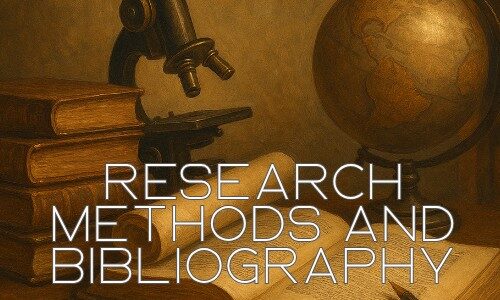This course is foundational for the doctoral process. It teaches students how to conduct high-level academic research, locate and evaluate primary and secondary sources, and engage with scholarly literature.
Research Methods and Bibliography
Level: Doctoral
Course Length: 10 weeks (approx. 150–180 hours total if following full module path)
Delivery Mode: Competency-based, self-paced with required final exam
Course Overview
This course equips doctoral students with the essential tools and skills for advanced academic research. Students will learn how to locate, evaluate, and engage with primary and secondary sources, organize bibliographic data, and interact with scholarly literature across theological and biblical studies. Emphasis is placed on the craft of research, from framing research questions to evaluating arguments, as well as on technical skills in bibliographic management, citation styles, and academic integrity.
The course is competency-based:
-
Students may complete all modules to prepare for the final exam, or
-
If they already have substantial research experience, they may skip directly to the final competency exam.
Competency is demonstrated by mastery of research design, source evaluation, and bibliographic documentation.
Learning Outcomes
By the end of this course, students will be able to:
-
Formulate precise research questions and design a plan of inquiry.
-
Locate and evaluate scholarly sources (both primary and secondary).
-
Engage critically with academic literature and identify major debates.
-
Employ citation styles (e.g., Turabian/Chicago, SBL, APA) with precision.
-
Use bibliographic tools (e.g., Zotero, EndNote) for research organization.
-
Demonstrate readiness to conduct dissertation-level research.
Weekly Breakdown (10 Weeks)
Week 1: Introduction to Doctoral Research (8–10 hours)
-
The nature and purpose of doctoral research.
-
Characteristics of scholarly work (originality, rigor, contribution).
-
Competency: Define the goals and scope of doctoral-level research.
Week 2: Research Design & Framing Questions (12–14 hours)
-
How to formulate a viable research question.
-
Hypotheses, objectives, and scope.
-
Competency: Draft a doctoral-level research proposal outline.
Week 3: Locating Sources (Primary & Secondary) (12–14 hours)
-
Identifying primary sources (texts, inscriptions, artifacts).
-
Using libraries, databases, and archives.
-
Competency: Demonstrate ability to locate diverse scholarly sources.
Week 4: Evaluating Sources (12–14 hours)
-
Criteria for evaluating credibility, relevance, and bias.
-
Peer-reviewed vs. non-academic sources.
-
Competency: Assess the quality of sources in a case study.
Week 5: Literature Review & Scholarly Dialogue (12–14 hours)
-
Purpose and structure of a literature review.
-
Identifying major voices and debates in scholarship.
-
Competency: Draft a mini literature review in chosen research area.
Week 6: Bibliographic Tools & Citation Management (10–12 hours)
-
Training in tools like Zotero, EndNote, Mendeley.
-
Organizing and annotating sources.
-
Competency: Build an annotated bibliography using software tools.
Week 7: Academic Writing & Citation Styles (12–14 hours)
-
Turabian/Chicago, SBL, APA, and MLA formats.
-
Avoiding plagiarism and ensuring academic integrity.
-
Competency: Produce correctly cited excerpts in multiple styles.
Week 8: Argumentation & Critical Engagement (12–14 hours)
-
How to analyze and interact with scholarly arguments.
-
Logical flow and structuring arguments.
-
Competency: Critique a published scholarly article.
Week 9: Research Presentation Skills (10–12 hours)
-
Preparing research for academic conferences.
-
Oral defense skills and visual presentation of data.
-
Competency: Create a 10-minute research presentation outline.
Week 10: Integration & Competency Exam Prep (12–14 hours)
-
Integration of research skills for dissertation readiness.
-
Mock dissertation proposal and bibliography exercise.
-
Final Competency Exam (required): Students demonstrate their ability to design a research project, evaluate sources, and produce a correctly formatted annotated bibliography.
Assessment
-
Competency Exam (100%): Students must design a mock research project, submit an annotated bibliography, and demonstrate mastery of source evaluation and citation practices.
-
Optional formative assessments: sample literature reviews, article critiques, and practice citation exercises (not required).
Curriculum
- 10 Sections
- 20 Lessons
- Lifetime
- Week 1: Introduction to Doctoral Research (8–10 hours)The nature and purpose of doctoral research. Characteristics of scholarly work (originality, rigor, contribution).2
- Week 2: Research Design & Framing Questions (12–14 hours)How to formulate a viable research question. Hypotheses, objectives, and scope.2
- Week 3: Locating Sources (Primary & Secondary) (12–14 hours)Identifying primary sources (texts, inscriptions, artifacts). Using libraries, databases, and archives.2
- Week 4: Evaluating Sources (12–14 hours)Criteria for evaluating credibility, relevance, and bias. Peer-reviewed vs. non-academic sources.2
- Week 5: Literature Review & Scholarly Dialogue (12–14 hours)Purpose and structure of a literature review. Identifying major voices and debates in scholarship.2
- Week 6: Bibliographic Tools & Citation Management (10–12 hours)Training in tools like Zotero, EndNote, Mendeley. Organizing and annotating sources.2
- Week 7: Academic Writing & Citation Styles (12–14 hours)Turabian/Chicago, SBL, APA, and MLA formats. Avoiding plagiarism and ensuring academic integrity.2
- Week 8: Argumentation & Critical Engagement (12–14 hours)How to analyze and interact with scholarly arguments. Logical flow and structuring arguments.2
- Week 9: Research Presentation Skills (10–12 hours)Preparing research for academic conferences. Oral defense skills and visual presentation of data.2
- Week 10: Integration & Competency Exam Prep (12–14 hours)2
Instructor

